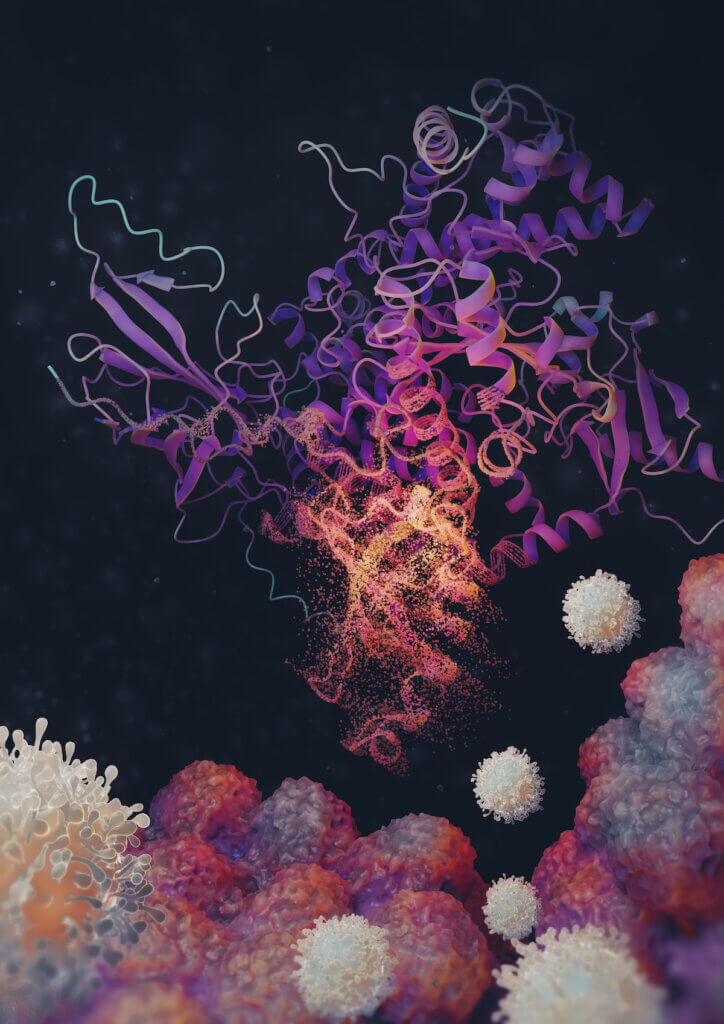Just modest positive commentary in regard to some of these Dana Farber (Harvard Hospitals) trials in monotherapy - would/should have profaned impact on the share price.
I say that for 2 reasons - in the last 18 months, much research centers on the need for combination PI3K anti cancer treatments. Most of the earlier trials were paxalisib, on its own.
Secondly and some small consolidation - is that the share price has been so badly beaten down , that positive words from Dana Farber in any of these breast/brain/PNSCL paxalisib monotherapy studies - well we can see the SP do anything. Off its current US$26M cap.
------------------------------------------------------------
Yet more good research - self explanatory. Remembering paxalisib has strong PI3B isoform structures. See also in bold from below story - the requirement for PI3K drugs in combination (Our findings show the potential of using a targeted drug to sensitize patients to immunotherapy treatment.0
Harvard hospitals have been strong supporters of paxalisib - so we are at crunch time now, to see if this belief is maintained.......the drug as a monotherapy, may not be seen as anywhere close to its full potential.
But we will see - ($26m come on ??)
Research Drives Key Protein from the Shadows to Reveal Its Role in Breast Cancer Subtype
Published: May 10, 2023
Updated: May 24, 2023
Written by: Rob Levy
In a branch of the PI3K protein family — with members named PI3Kα, PI3Kβ, PI3Kδ, and PI3Kγ — PI3Kβ was long treated as the proverbial middle child: neglected by cancer scientists in favor of its more prominent siblings.
In a new study, Dana-Farber researchers demonstrate that it doesn’t deserve its obscurity — that in fact it plays a key role in helping certain breast cancers duck an immune system attack, and that a combination of PI3Kβ-blocking drugs and immunotherapy agents could well be effective against these cancers.
The study, published in the journal Nature, involves triple negative breast cancers with a mutated form of the Pten gene, which account for approximately 30% of cases of the disease. PTEN is a tumor-suppressor gene, meaning it replies to the cell’s “grow, grow, grow” messages with a “not so fast” message of its own, keeping cell growth and division under control. When PTEN, the protein made from the PTEN gene, is missing or scarce because of a mutation or other problem with PTEN production, its steadying influence is weakened. Loss of PTEN can also dampen the immune response to cancer and make tumors less vulnerable to immunotherapy.
In a paper in 2008, Dana-Farber’s Jean Zhao, PhD, Thomas Roberts, PhD, the senior authors of the new study, and their colleagues reported that PTEN-deficient tumors often depend on PI3Kβ to grow and survive. What form that dependency takes — how PI3Kβ exploits the absence of PTEN to sustain and protect tumors — was unclear.
The new paper points to PI3Kβ’s entanglement with the immune system.
“The PI3K pathway [the series of gene and protein interactions sparked by PI3K] is critical for normal physiological function,” Zhao says. “Abnormal activity of this pathway occurs in a wide variety of tumor types, and it is the most frequently targeted pathway in cancer medicine.”
An illustration of the PI3Kβ protein (shown in purple) targeted by a drug molecule. Photo Credit: Hassan Tahini from ScienceBrush
The arsenal of cancer drugs includes approved agents that target PI3Kα, PI3Kδ, and PI3Kγ, but none has yet been approved for PI3Kβ, befitting its reputation as the least consequential of the PI3K clan.
To probe PI3Kβ’s role, researchers engineered animal models of invasive breast cancers that lacked working copies of Pten and another tumor-suppressor gene, Trp53. When they genetically inactivated PI3Kβ, the result was a vigorous immune response that eradicated the tumors. In animals with a weakened immune system, by contrast, tumor growth continued after PI3Kβ was inactivated.
“Mechanistically, we found that deactivating PI3Kβ in these PTEN-negative tumors led to reduced signaling by the STAT3 protein, which increased the production of immune stimulatory molecules, promoting an anti-tumor response by the immune system,” Zhao relates.
When researchers blocked PI3Kβ with a drug molecule, the result was similar to what occurred with genetic PI3Kβ-deleting techniques: a full-throttle immune attack on the tumor. The response was even greater when researchers combined the drug molecule with immunotherapy.
“Our results point to the potential of this combined approach to treating patients with this type of breast cancer,” Zhao remarks, noting that efforts to develop and test PI3Kβ inhibitors are currently under way in the biotech industry.
“Immunotherapy has changed the way we treat cancer, but not all patients respond,” says Johann Bergholz, PhD, a co-lead author of the study with Dana-Farber and Broad Institute colleagues Qiwei Wang, PhD, and Qi Wang, PhD. “Our findings show the potential of using a targeted drug to sensitize patients to immunotherapy treatment.”
- Forums
- ASX - By Stock
- KZA
- Ann: Kazia CEO participates in White House Cancer Moonshot Forum
Ann: Kazia CEO participates in White House Cancer Moonshot Forum, page-4
-
- There are more pages in this discussion • 4 more messages in this thread...
You’re viewing a single post only. To view the entire thread just sign in or Join Now (FREE)
Featured News
Add KZA (ASX) to my watchlist
Currently unlisted public company.
The Watchlist
EQN
EQUINOX RESOURCES LIMITED.
Zac Komur, MD & CEO
Zac Komur
MD & CEO
SPONSORED BY The Market Online










